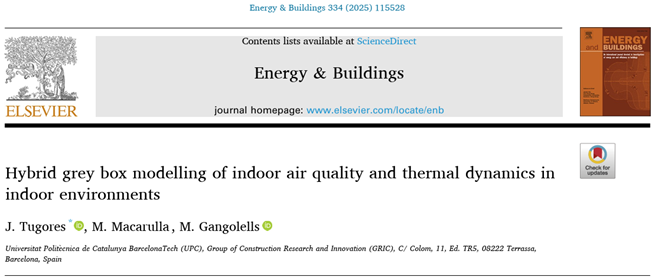IAQ4EDU project develops a hybrid model for managing indoor air quality and thermal comfort with mechanical ventilation
Mar 26, 2025
The study has been published in Energy and Buildings
The IAQ4EDU project has developed a model to assess indoor air quality and thermal comfort in environments with mechanical ventilation. The study, titled "Hybrid grey box modelling of indoor air quality and thermal dynamics in indoor environments", has been published in Energy and Buildings (JCR-Q1, Impact Factor: 6.6). The research was conducted by PhD candidate Juan Tugores, under the supervision of Prof. Marta Gangolells, principal investigator of the IAQ4EDU project, and Prof. Marcel Macarulla, project researcher.
Heating, ventilation, and air conditioning (HVAC) systems play a crucial role in ensuring a healthy and comfortable indoor environment. Grey-box models have become valuable tools for analyzing and modeling these systems in real-world settings. However, most existing models have addressed air quality and thermal comfort separately, limiting their accuracy and practical applicability. This study proposes a hybrid grey-box model that integrates air dynamics and temperature regulation to provide a more precise and realistic analysis.
The methodology is based on estimating mechanical ventilation rates by modeling indoor CO₂ concentration using on-site collected data. Based on these results, a second model simulates indoor temperature and evaluates the thermal properties and energy consumption of climate control systems. In total, four air quality models and six thermal models have been developed to identify the most effective combination of variables and parameters. The findings will enable optimized management of mechanical ventilation and climate control in educational settings, contributing to predictive control models (MPC).
![Figure 1_Methodolohy [bw-1.5col].png](https://iaq4edu.upc.edu/ca/noticies/figure-1_methodolohy-bw-1-5col.png/@@images/image-600-045180a0026b20996a6a33f15249258b.png)
Methodology for developing the hybrid iaq and thermal comfort model
For more details, you can access the online version of the article here: https://doi.org/10.1016/j.enbuild.2025.115528
For more information visit our social media pages:
 LinkedIn of the project
LinkedIn of the project  GRIC's Twitter
GRIC's Twitter  ResearchGate
ResearchGate


Share: